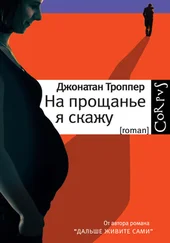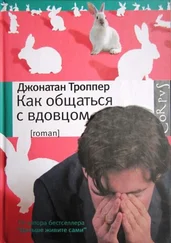Джонатан Троппер - This Is Where I Leave You
Здесь есть возможность читать онлайн «Джонатан Троппер - This Is Where I Leave You» весь текст электронной книги совершенно бесплатно (целиком полную версию без сокращений). В некоторых случаях можно слушать аудио, скачать через торрент в формате fb2 и присутствует краткое содержание. Год выпуска: 2009, ISBN: 2009, Издательство: Penguin Group (USA), Inc., Жанр: Проза, на английском языке. Описание произведения, (предисловие) а так же отзывы посетителей доступны на портале библиотеки ЛибКат.
- Название:This Is Where I Leave You
- Автор:
- Издательство:Penguin Group (USA), Inc.
- Жанр:
- Год:2009
- ISBN:978-1-101-10898-7
- Рейтинг книги:5 / 5. Голосов: 1
-
Избранное:Добавить в избранное
- Отзывы:
-
Ваша оценка:
- 100
- 1
- 2
- 3
- 4
- 5
This Is Where I Leave You: краткое содержание, описание и аннотация
Предлагаем к чтению аннотацию, описание, краткое содержание или предисловие (зависит от того, что написал сам автор книги «This Is Where I Leave You»). Если вы не нашли необходимую информацию о книге — напишите в комментариях, мы постараемся отыскать её.
This Is Where I Leave You — читать онлайн бесплатно полную книгу (весь текст) целиком
Ниже представлен текст книги, разбитый по страницам. Система сохранения места последней прочитанной страницы, позволяет с удобством читать онлайн бесплатно книгу «This Is Where I Leave You», без необходимости каждый раз заново искать на чём Вы остановились. Поставьте закладку, и сможете в любой момент перейти на страницу, на которой закончили чтение.
Интервал:
Закладка:
Linda steps out from the kitchen, her expression grim, and makes her way through the visitors. She whispers something into Applebaum’s ear, and his expression falls, his face turning red. He follows Linda back into the kitchen while Mom looks on, somewhat concerned. Behind the swinging door, slightly raised voices are drowned out by the sound of the Cuisinart. A few moments later, Applebaum shuffles down the front hall, stooped and deflated, pausing just long enough to leave a few bills on the tip plate next to the memorial candle. I feel sorry for him. There is some basis for comparison between us, I think.
Linda reemerges at the kitchen door and she and my mother exchange a long, dense look over the heads of the shiva callers, decimating whatever lingering doubts I might have had. Wendy looks over at me, raising a drawn eyebrow into something like a question mark, but she’s not really asking.
SOME DISTANT RELATIVES have driven up from Long Island to pay their respects: my mother’s first cousin Sandra, her husband, Calvin, and their twin teenage sex-kitten daughters. The girls are vacant and beautiful and wield their budding sexuality with a certain lack of control, like a toddler with a power tool. They stretch their long, ripe bodies out on the couch and look around the room with the dismayed air of the recently conned. It was a long way to come for a room full of irrelevant relatives.
There is an air of striving perfection about this family, evident in Sandra’s expensive-looking haircut and pedicure, Cal’s—for that’s what they call him—diamond-encrusted watch and expensive polo shirt with a golf club logo, in the girls’ smooth, tanned legs dipped into white canvas tennis shoes, their blown hair, their flawless complexions. This isn’t a family, it’s a Christmas card. You can picture the plush carpets of their home in Long Island with views of the Sound, the stonework around the front door, the marble and mirrors in the foyer, the perfectly manicured lawn, the sixty-inch plasma television and leather furniture in the den, the art deco living room that no one is allowed into with shoes, the two-year leases on their matching Lexuses.
I don’t like Cal. Cal’s friends, if he has any, probably don’t like him either. He has hairy forearms, showy biceps, a store-bought tan, and predatory eyes that seem to be looking for a conversation to interrupt, an argument to have. But Mom seems genuinely fond of Sandra, whose mother died when she was a young girl. Mom’s parents took her in for a few years. There’s a bond there.
“Cindy’s on the swim team, All-American,” Sandra tells mom. “And Dana’s captain of the lacrosse team.”
“We should send them equipment,” Mom says. “Paul, you’ll send them a package?”
“Sure, Mom.”
“I can’t believe Mort’s gone,” Sandra says, and then, unbelievably, starts to cry.
“He was a tough old guy,” Cal says. If I didn’t know this was his crude way of showing respect, I’d throw something at him. And then he’d probably beat the shit out of me.
“He was always very fond of you,” Mom says, taking Sandra’s hand, and I’m thinking, If he was so fond of her, why is this only the third time in my life I’ve seen these people?
“Wendy, where’s the wedding album?”
Wendy pulls out the album, which creaks like a rusty hinge, and Mom and Sandra start playing a game where they identify dead relatives I’ve never heard of: aunts and uncles, a cousin with polio, a family friend who went to jail for armed robbery. “Come here, girls,” Sandra says. The two girls slink over like cats. Phillip watches them a little too closely. Wendy smacks the back of his head.
“What?”
“You know what.”
Mom shows us all pictures of her wedding—the washed-out colors, the men with their mustaches, the cigarettes during dinner, the bad toupees, the black plastic spectacle frames that make every man look like he works for the CIA. “You see how pretty I was,” Mom says to the bored twins. She’s not bragging. She’s just looking at their dewy perfection and realizing that she’s so much older than she ever believed she’d be. In most of the photos, Dad looks worried in his borrowed tuxedo, like there might be all sorts of trouble brewing right outside the frame. But there’s one of the two of them, on the stairs of the catering hall; he’s carrying her in his arms and they’re laughing, at the photographer, at themselves in their ridiculous gown and tux, at the idea that they can do this thing, start a family. A lump forms in my throat and lodges there. You can kind of see who they were back then, innocent and in love; long before kids and a mortgage and rottweilers and cancer and possible (probable) lesbianism.
“He looks so handsome there,” Sandra says.
“I could barely walk the next morning,” Mom says.
The girls giggle loudly and shake like wind chimes. Wendy smacks Phillip’s head again. This time he doesn’t ask why.
PAUL AND HIS friends have stepped outside into the side yard, where Paul’s old batting cage still stands. Boner, who played shortstop in high school, wonders if he can still hit Paul’s fastball. Paul wonders if he can still throw it. Horry, who lettered in football and played hockey in the county league, will don the musty catcher’s gear, and Dan, who played outfield, will call balls and strikes. The other guys will stand around spinning bats like swords and making asinine comments, and Phillip and I will watch to see who makes a fool of himself first. There’s simply no way to calculate the odds.
Paul pulls out his old glove and starts warming up, throwing lightly to Horry, rolling his shoulder around in its socket to loosen up. Even after all this time, his motion is graceful and assured, his body uncoiling precisely from his windup to launch each pitch. Boner tries out a few bats—we have no shortage of gear—and then steps into the netting, digging his flip-flops into the grass, settling down into his stance. He works the bat around for a little bit, and then Dan steps behind Horry, a cigarette dangling from his mouth, and says, “Batter up!”
Paul’s first pitch goes a little wide and Boner holds his swing in check. Dan calls it a ball. The second pitch is low, but Boner swings anyway and misses.
“Strike one! One and one.”
Paul shakes his head, not pleased with the pitch. He rolls his head around on his neck and shrugs his shoulders a few times. Then he settles and stares down the batter. He winds up and unleashes a straight fast-ball that lands in Horry’s glove before Boner’s swing has even crossed the plate.
“Strike two!”
The other guys applaud and cheer. They are all meatheads, their best years behind them. Tracy and Alice join us in the yard, along with Boner’s wife and a few random shiva callers who are happy for the diversion. Paul bangs his mitt against his shoulder and grimaces a little, like it’s tender. His next pitch is a changeup, and Boner manages to catch the edge of it, fouling it up into the net.
“Strike two!”
“Come on,” Boner says. “Now I got you.”
Paul removes his mitt to rub his pitching shoulder for a minute, trying to mask the pain he’s feeling.
“Paul,” Alice says. “It’s enough.”
His ligaments were shredded like cheese, the muscle ripped right off the bone. They did what they could to reassemble the working parts, but the lumpy patchwork mess of surgically spliced tissue beneath his skin cannot support the strain he’s putting on it with these pitches.
“It’s fine. I just need one more pitch.”
“The hell you do,” Boner says.
Alice shakes her head sadly.
Читать дальшеИнтервал:
Закладка:
Похожие книги на «This Is Where I Leave You»
Представляем Вашему вниманию похожие книги на «This Is Where I Leave You» списком для выбора. Мы отобрали схожую по названию и смыслу литературу в надежде предоставить читателям больше вариантов отыскать новые, интересные, ещё непрочитанные произведения.
Обсуждение, отзывы о книге «This Is Where I Leave You» и просто собственные мнения читателей. Оставьте ваши комментарии, напишите, что Вы думаете о произведении, его смысле или главных героях. Укажите что конкретно понравилось, а что нет, и почему Вы так считаете.







![Джонатан Троппер - Как общаться с вдовцом [litres]](/books/429483/dzhonatan-tropper-kak-obchatsya-s-vdovcom-litres-thumb.webp)
![Джонатан Троппер - Дальше живите сами [litres]](/books/429484/dzhonatan-tropper-dalshe-zhivite-sami-litres-thumb.webp)



